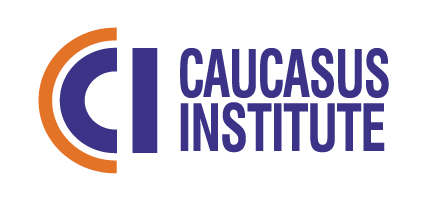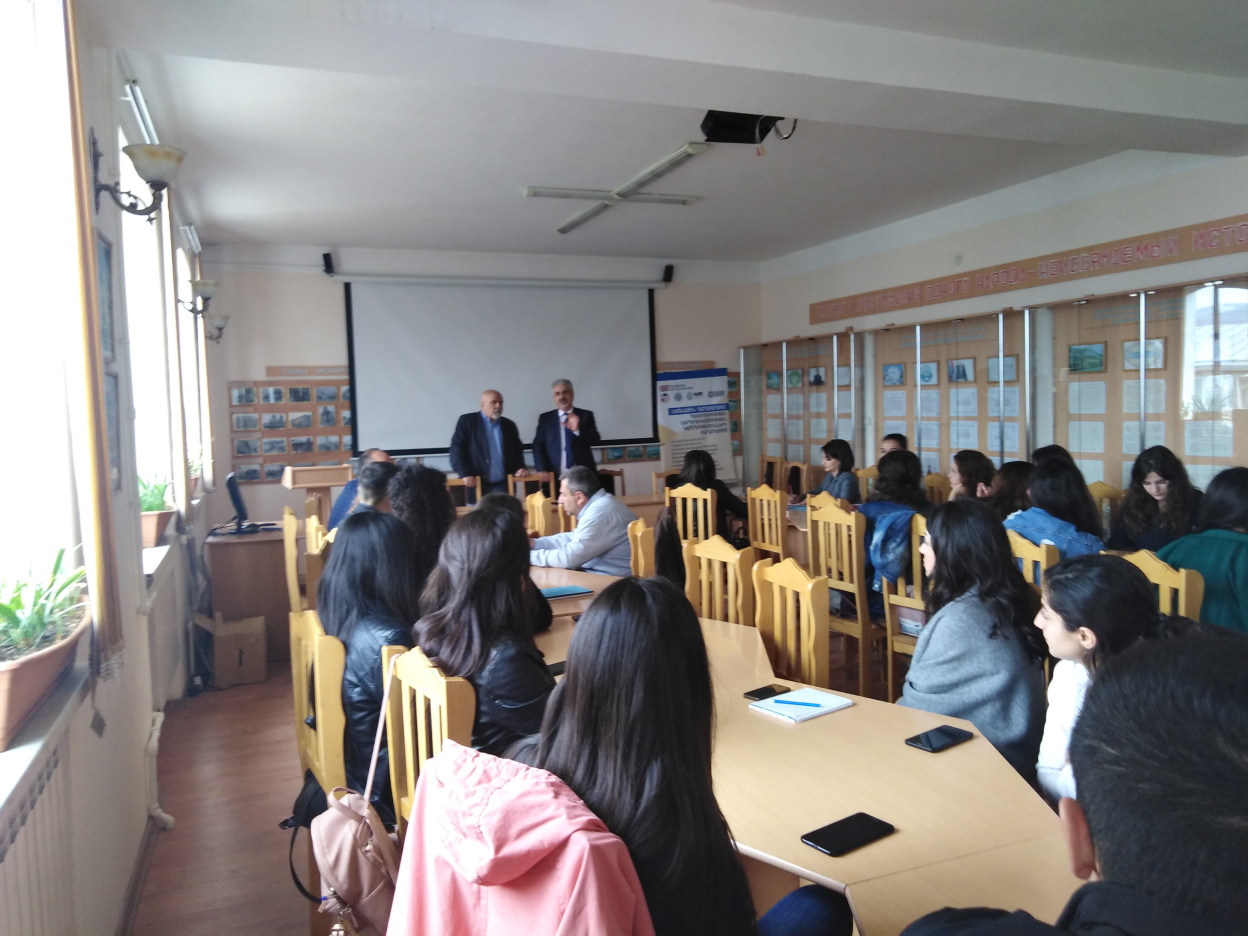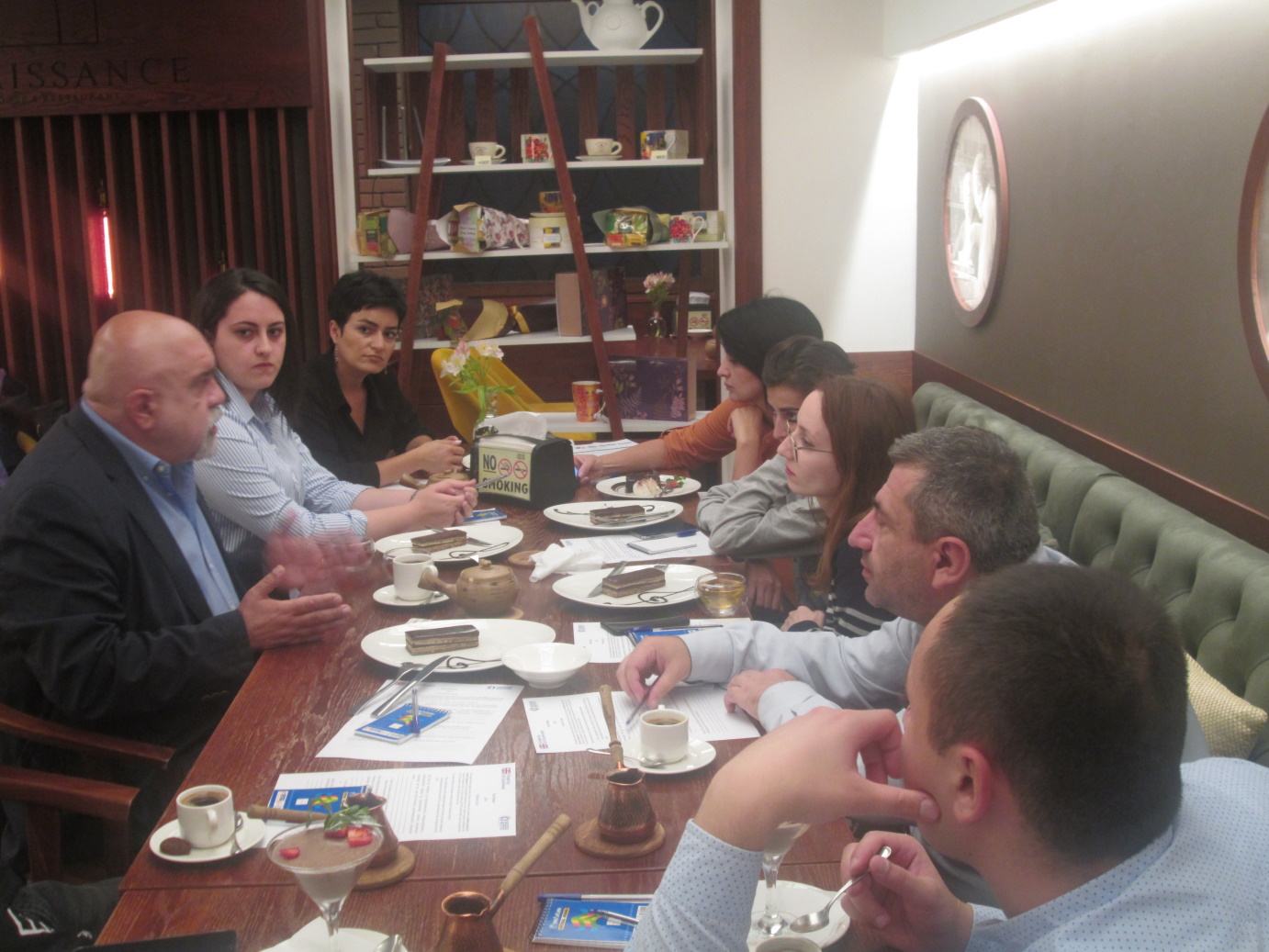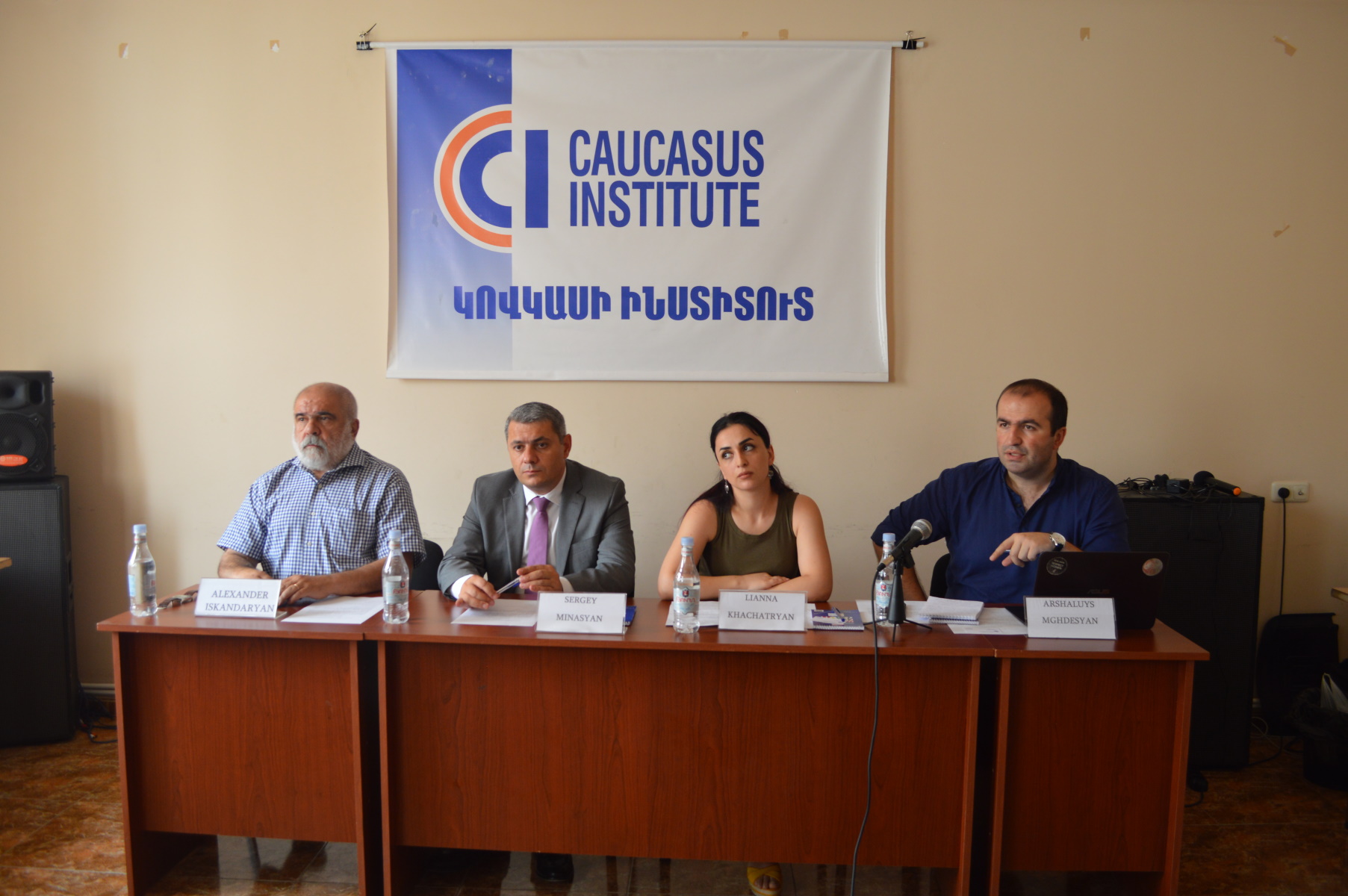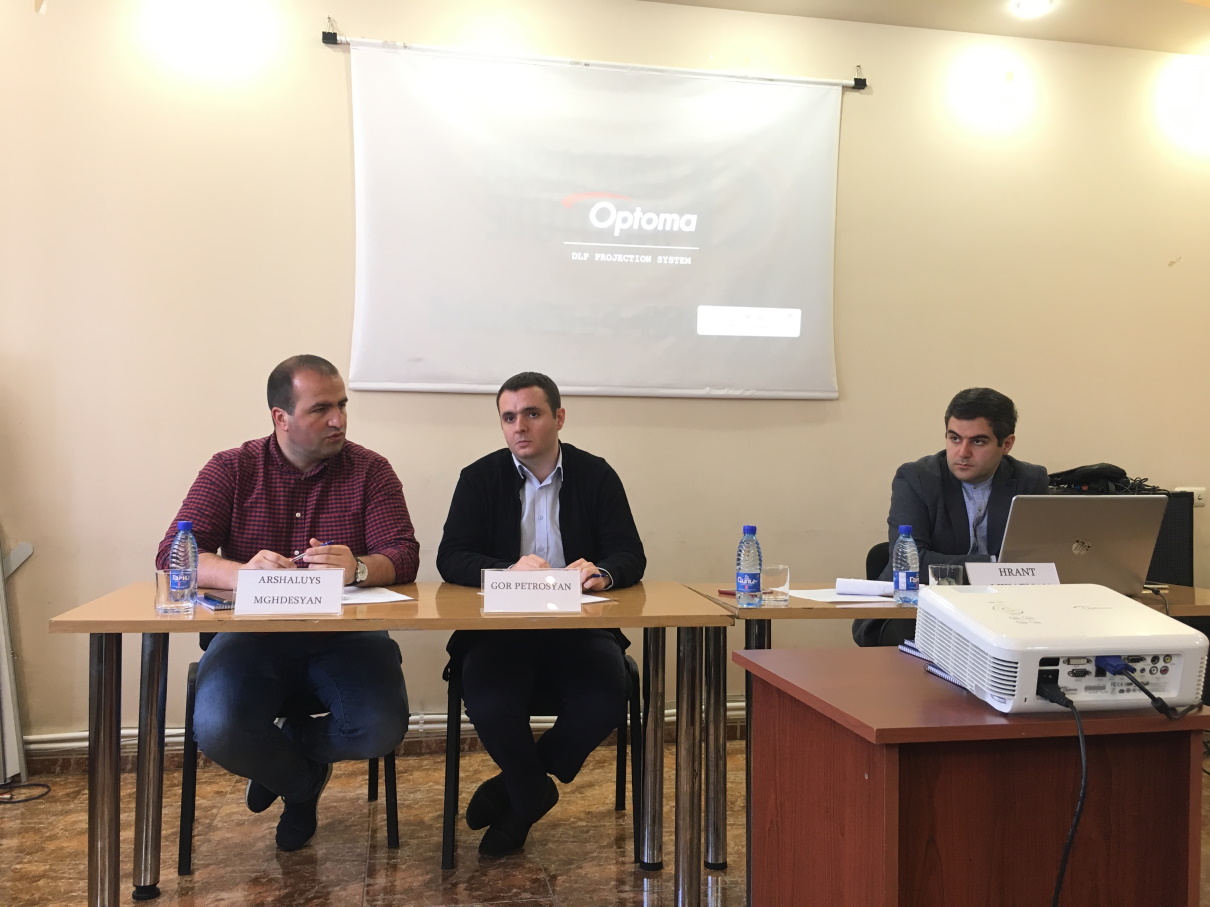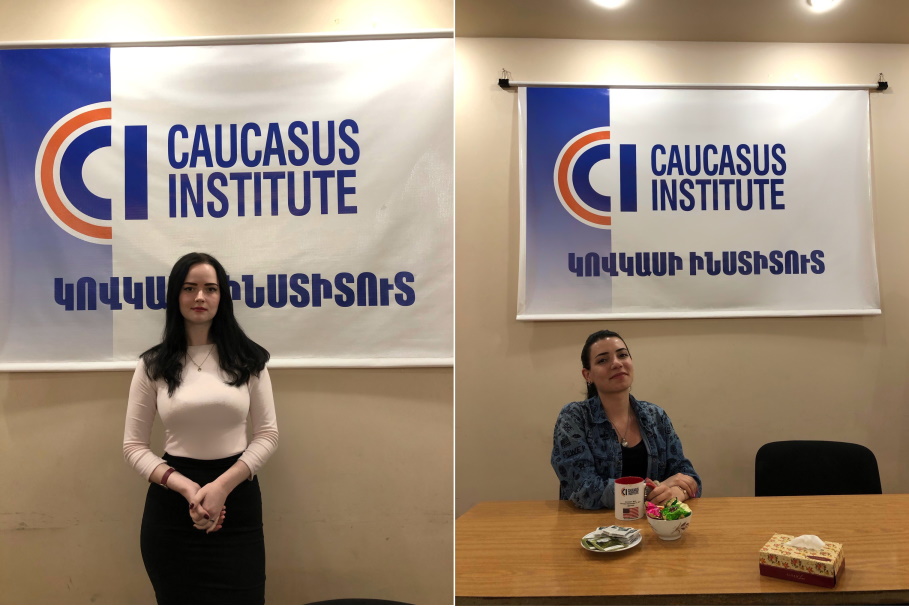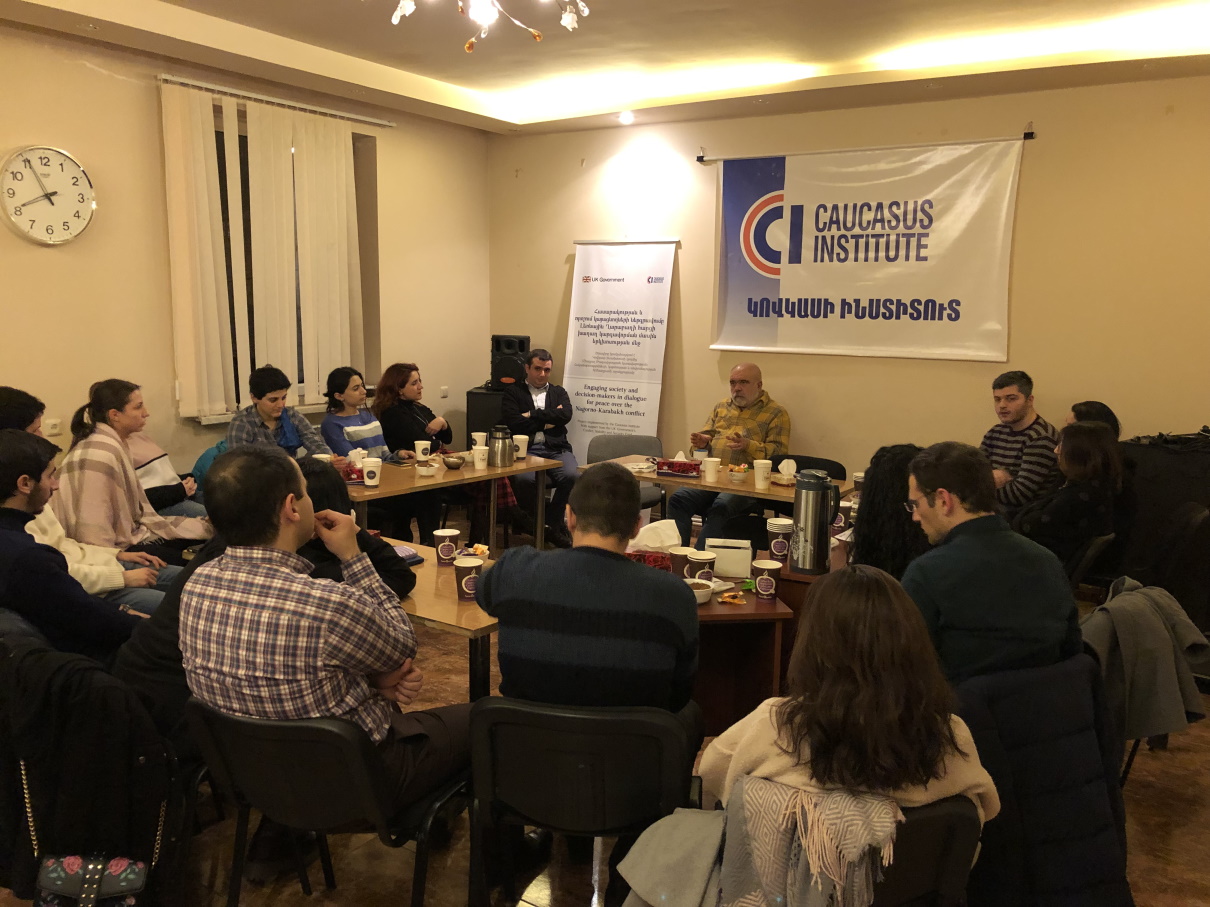Caucasus Institute organizes various events, round tables, conferences, trainings and seminars. These events are aimed at strengthening the bond between science and society, fostering pluralism and stimulating the transfer of research results.
Lecture
EMERGENCE OF DEMOCRACY AND ITS TYPES
As young democracies, Nagorno-Karabakh and Armenia have a long way to go in order to develop the culture of elections and conscious voting and responsibility for one’s vote. Yet, unlike developed democracies, the new ones at least have examples, which can help accelerate that process. This idea was voiced by Alexander Iskandaryan, director of the Caucasus Institute during the “Emergence of democracy and its types” lecture at Artsakh State University in Stepanakert on September 12, 2019. The discussions are held in the framework of a project on Building Capacity for Societal Engagement in Nagorno-Karabakh implemented by the Caucasus Institute in partnership with Armavir Development Centre, Civil Society Institute and INTRA Mental Health Centre with support from the UK Government’s Conflict, Stability and Security Fund. The opinions and statements that were made and discussed during the event may not coincide with the official position of the UK Government.
Tea party
DEMOCRACY, DEMOCRATIZATION AND ELECTIONS
Do we have the right to complain about our own choices after elections? Or should we keep silent and just accept our responsibility for the choices contemplating the repercussions? That was one of the questions that were discussed during the CI Tea Party held in Stepanakert on September 12, 2019 and moderated by Alexander Iskandaryan, Director of the Caucasus Institute.
The discussions are held in the framework of a project on Building Capacity for Societal Engagement in Nagorno-Karabakh implemented by the Caucasus Institute in partnership with Armavir Development Centre, Civil Society Institute and INTRA Mental Health Centre with support from the UK Government’s Conflict, Stability and Security Fund. The opinions and statements that will be made and discussed during the event may not coincide with the official position of the UK Government.
Roundtable
ARMENIA AND ROMANIA: COMMUNITY, COOPERATION AND PERSPECTIVES
The event was organized within the framework of the Transition Experience Exchange between Romania and Armenia program, implemented by the Caucasus Institute. The program is a joint initiative of the Caucasus Institute (Armenia) and Expert Forum (EFOR, Romania) supported by the Black Sea Trust for Regional Cooperation, a Project of The German Marshall Fund of the United States. Opinions expressed during the discussion do not necessarily represent those of the Black Sea Trust or its partners.
Debate
DEBATE ON “ANTI-CORRUPTION EXPERIENCE IN THE EU MEMBER STATES: WHAT CAN ARMENIA LEARN?”
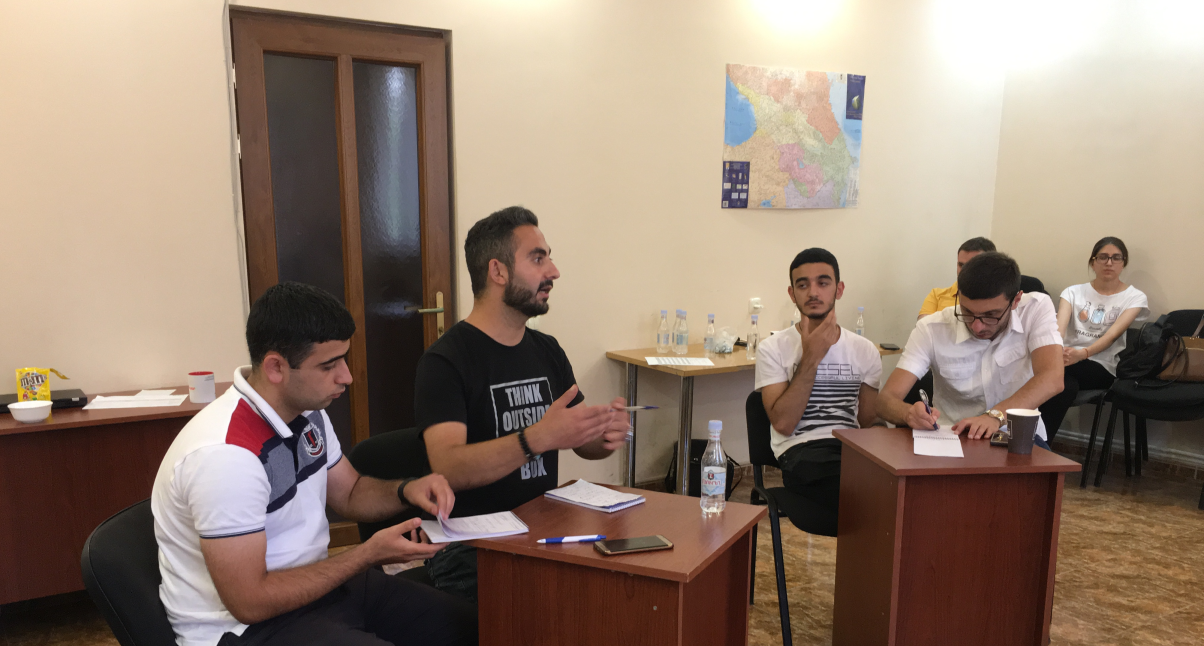 Anti-Corruption Experience in the EU Member States: What Can Armenia Learn? This was the topic of a youth political debate held at the Caucasus Institute on July 18, 2019. At the beginning, Gor Petrosyan, CI research fellow, presented Romania’s anti-corruption experience.
Anti-Corruption Experience in the EU Member States: What Can Armenia Learn? This was the topic of a youth political debate held at the Caucasus Institute on July 18, 2019. At the beginning, Gor Petrosyan, CI research fellow, presented Romania’s anti-corruption experience.
The participants were divided into four groups representing:
• Anti-corruption Commission
• Members of a legislature (the ruling party members)
• Parliamentary opposition
• Private sector
The first part of the event unfolded in two stages:
• First, one general question was asked, in response to which each of the debating teams delivered a speech. Then the teams proceeded with Q&A.
• The second stage was a quiz that was followed by the final presentations of the debating teams summarizing the debates.
The main question raised during the first stage of the second part of the event was: what is the fight against corruption?
The second stage, a quiz included but was not limited to the following questions:
– Is the fight against corrupt officials actually fight against corruption?
– Is there only financial corruption?
– Minor or major corruption? Which is more dangerous?
– Does democracy contribute to the fight against corruption?
After the debate, participants shared their impressions of the event.
The program is a joint initiative of the Caucasus Institute (Armenia) and Expert Forum (EFOR, Romania) supported by the Black Sea Trust for Regional Cooperation, a Project of The The German Marshall Fund of the United States.
Opinions expressed in the print brochure do not necessarily represent those of the Black Sea Trust or its partners.
Workshop
PEACE OR WAR: CAN I MAKE A DIFFERENCE?
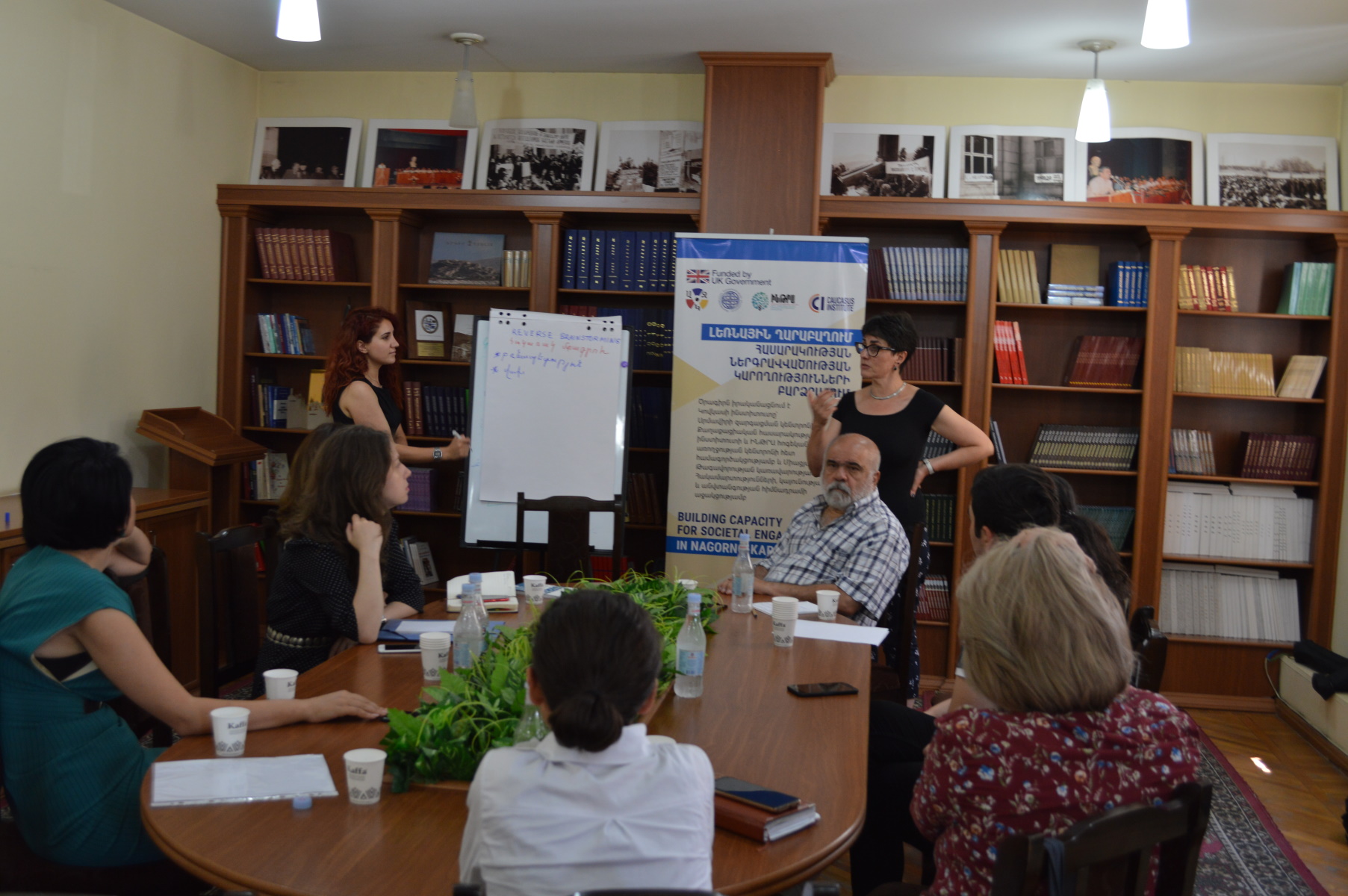 On June 28, 2019 the Caucasus Institute hosted a workshop at the National Assembly of Nagorno-Karabakh on societal engagement in decision-making over the resolution of the Nagorno-Karabakh conflict.
On June 28, 2019 the Caucasus Institute hosted a workshop at the National Assembly of Nagorno-Karabakh on societal engagement in decision-making over the resolution of the Nagorno-Karabakh conflict.
CI expert Nina Iskandaryan moderated the first part of the workshop. Ms. Iskandaryan conducted a brainstorming activity, engaging the participants in examining the level of freedoms and democracy in their society, drawing conclusions regarding their role in the peacebuilding activities, as well as in determining political and social life of their country.
CI research fellow Gor Petrosyan touched upon the conflict in Nagorno-Karabakh, highlighting the fact that the keys to the conflict resolution do not lay in Paris, Moscow or elsewhere. The axis of the conflict is Yerevan-Stepanakert-Baku, where the societies are more radical than the elites. Inasmuch as they influence the political leadership, a shift in societal perceptions is necessary. The speaker generated a debate-discussion concerning the role of a citizen in this particular context. Alexander Iskandaryan, Director of the Caucasus Institute made some final remarks and answered to the questions of the participants regarding citizen participation, upcoming elections in Karabakh etc.
The workshop is part of a project on Building Capacity for Societal Engagement in Nagorno-Karabakh implemented by the Caucasus Institute in partnership with Armavir Development Centre, Civil Society Institute and INTRA Mental Health Centre with support from the UK Government’s Conflict, Stability and Security Fund.
Lecture
EMERGENCE AND EVOLUTION OF DEMOCRACY
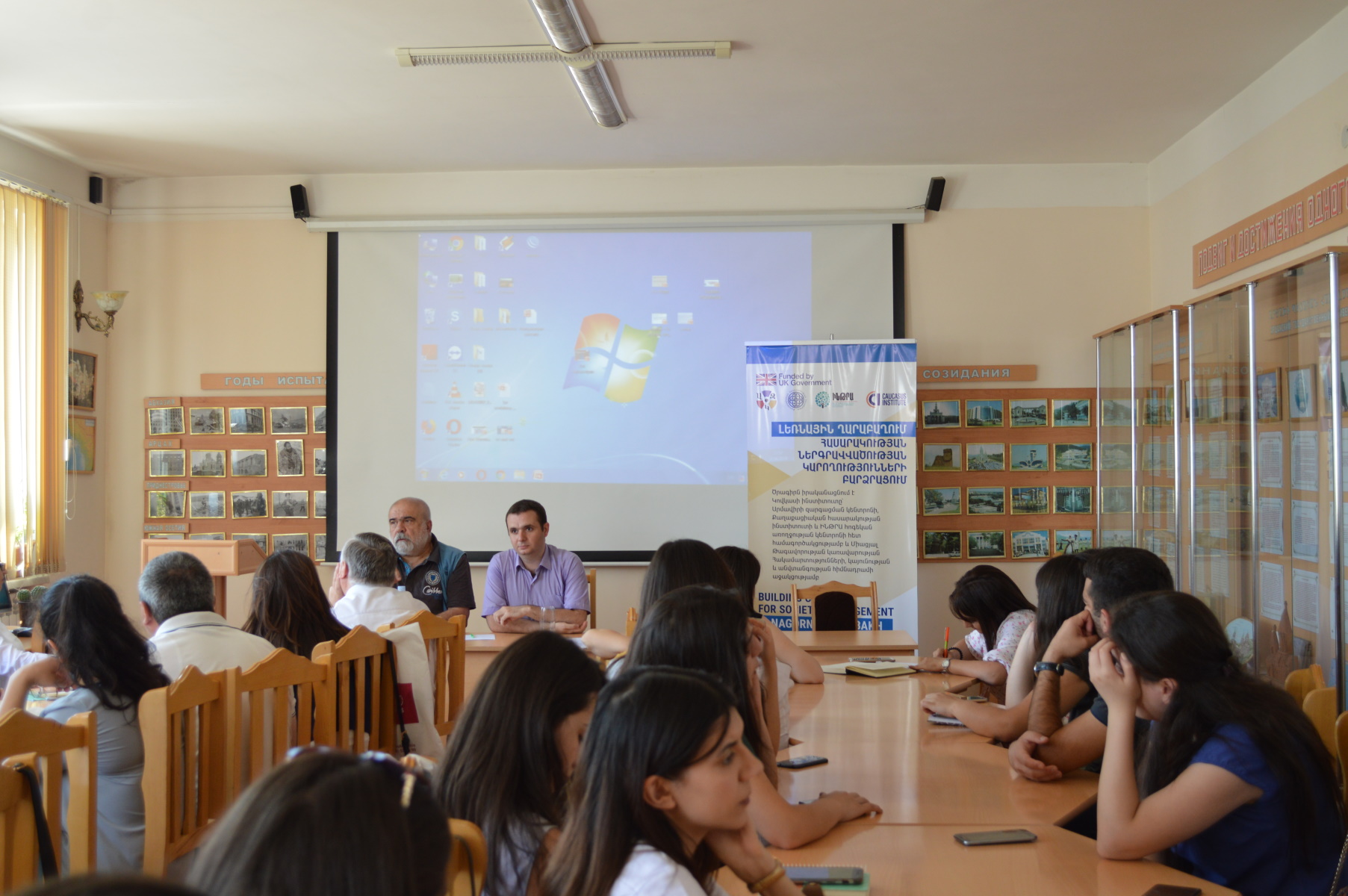 On June 25 Caucasus Institute organized a public lecture at the Artsakh State University which was conducted by the Director of the Caucasus Institute Alexander Iskandaryan and research fellow of the Caucasus Institute Gor Petrosyan. The lecture was hosted by Artsakh State University. During the lecture speakers touched upon the origins and grounds of emergence of democracy. During lecture the speakers represented to the audience the historical preconditions for the emergence of democracy, historical stages and stages of transformation of democracy. Speakers in detail explained the meaning of democracy in modern world, the systems and requirements needed to fulfill in order to be named democracy.
On June 25 Caucasus Institute organized a public lecture at the Artsakh State University which was conducted by the Director of the Caucasus Institute Alexander Iskandaryan and research fellow of the Caucasus Institute Gor Petrosyan. The lecture was hosted by Artsakh State University. During the lecture speakers touched upon the origins and grounds of emergence of democracy. During lecture the speakers represented to the audience the historical preconditions for the emergence of democracy, historical stages and stages of transformation of democracy. Speakers in detail explained the meaning of democracy in modern world, the systems and requirements needed to fulfill in order to be named democracy.
The lecture was followed by a Q&A session, where the participants of the lecture discussed the theoretical backgrounds and the threats democracy faces today. The issue of competence in democratic societies also was touched upon. The students and lecturers of Artsakh State University were also interested about local, regional and international processes and developments.
The lectures are held in the framework of a project on Building Capacity for Societal Engagement in Nagorno-Karabakh implemented by the Caucasus Institute in partnership with Armavir Development Centre, Civil Society Institute and INTRA Mental Health Centre with support from the UK Government’s Conflict, Stability and Security Fund.
Tea Party
THE PHENOMENON OF NON-RECOGNITION: ARE UNRECOGNIZED STATES REAL STATES?
 On June 27, 2019 the Caucasus Institute organized a tea party at the The Roots Café, Stepanakert with young scholars and students in the framework of a series of informal discussions. Alexander Iskandaryan, Director of the Caucasus Institute, and Gor Petrosyan, Research fellow at the CI, were moderating the event. The speakers described the phenomena of recognition, discussing examples of various non-recognized states. Particularly, they discussed the conditions of statehood as required by international law (Montevideo Convetion) and examined the evolution of those conditions throughout the history. They drew attention to the fact the recognition is a vague concept; it is a political act that can take place in various forms, mostly confirming the already existing, de-facto situation. The speakers also represented the history of recognition, explaining that although it formulated only in the 20th century, the phenomena existed long ago.
On June 27, 2019 the Caucasus Institute organized a tea party at the The Roots Café, Stepanakert with young scholars and students in the framework of a series of informal discussions. Alexander Iskandaryan, Director of the Caucasus Institute, and Gor Petrosyan, Research fellow at the CI, were moderating the event. The speakers described the phenomena of recognition, discussing examples of various non-recognized states. Particularly, they discussed the conditions of statehood as required by international law (Montevideo Convetion) and examined the evolution of those conditions throughout the history. They drew attention to the fact the recognition is a vague concept; it is a political act that can take place in various forms, mostly confirming the already existing, de-facto situation. The speakers also represented the history of recognition, explaining that although it formulated only in the 20th century, the phenomena existed long ago.
After the introductory notes, the participants of the event engaged in an active Q&A session and a debate-discussion. The issues of particular interest to participants were the experience of other non-recognized entities like Kosovo, Taiwan, Abkhazia etc., the peculiarities of the interpretation of the international law in each particular case, as well as issues related to inner political developments in Nagorno-Karabakh and Armenia. The participants also asked the speakers to interpret various issues existing on the negotiations table concerning the status of Nagorno-Karabakh. All of the participants were involved in the debate expressing their own point of view on the mentioned topics and trying to get answers to their questions.
The discussions are held in the framework of a project on Building Capacity for Societal Engagement in Nagorno-Karabakh implemented by the Caucasus Institute in partnership with Armavir Development Centre, Civil Society Institute and INTRA Mental Health Centre with support from the UK Government’s Conflict, Stability and Security Fund.
Presentation
ASSESSMENTS OF THE RISKS OF WAR
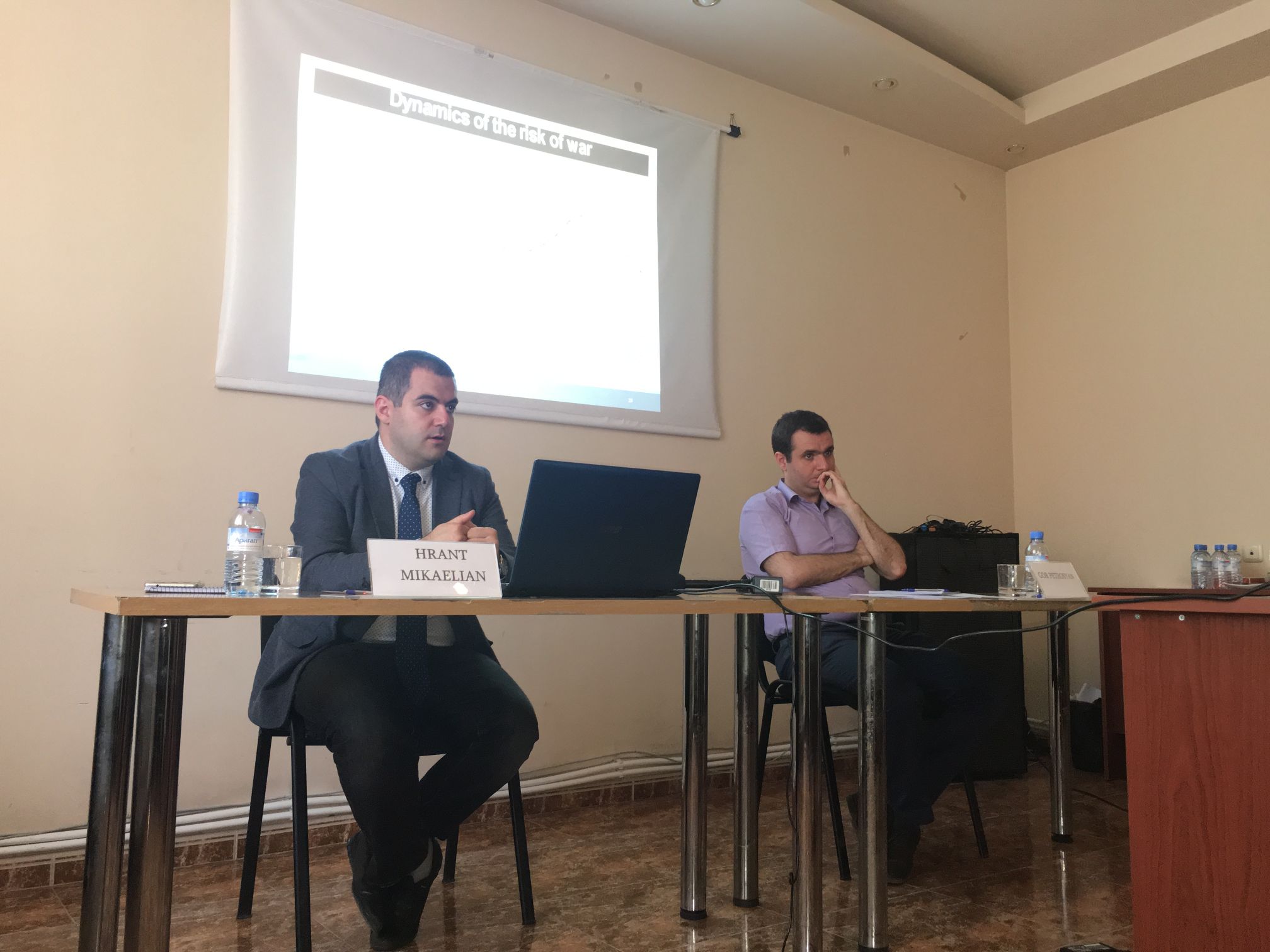 On March 24, 2019 the Caucasus Institute held a presentation of a new quantitative methodology elaborated to assess military risks in the Karabakh conflict. This is a series of Assessments of the risks of war in the Nagorno-Karabakh conflict launched in 2018 by the Caucasus Institute within the framework of a project on Engaging society and decision-makers in dialogue for peace over the Nagorno-Karabakh conflict, implemented with support from the UK Government’s Conflict, Stability and Security Fund.
On March 24, 2019 the Caucasus Institute held a presentation of a new quantitative methodology elaborated to assess military risks in the Karabakh conflict. This is a series of Assessments of the risks of war in the Nagorno-Karabakh conflict launched in 2018 by the Caucasus Institute within the framework of a project on Engaging society and decision-makers in dialogue for peace over the Nagorno-Karabakh conflict, implemented with support from the UK Government’s Conflict, Stability and Security Fund.
The presentation covered the rationale and conceptual framework for this assessment and the methodology used to produce it. CI research fellow Hrant Mikaelian presented the assessment.
An open debate followed, moderated by CI fellow Gor Petrosyan.
International Conference
CAUCASUS-2018
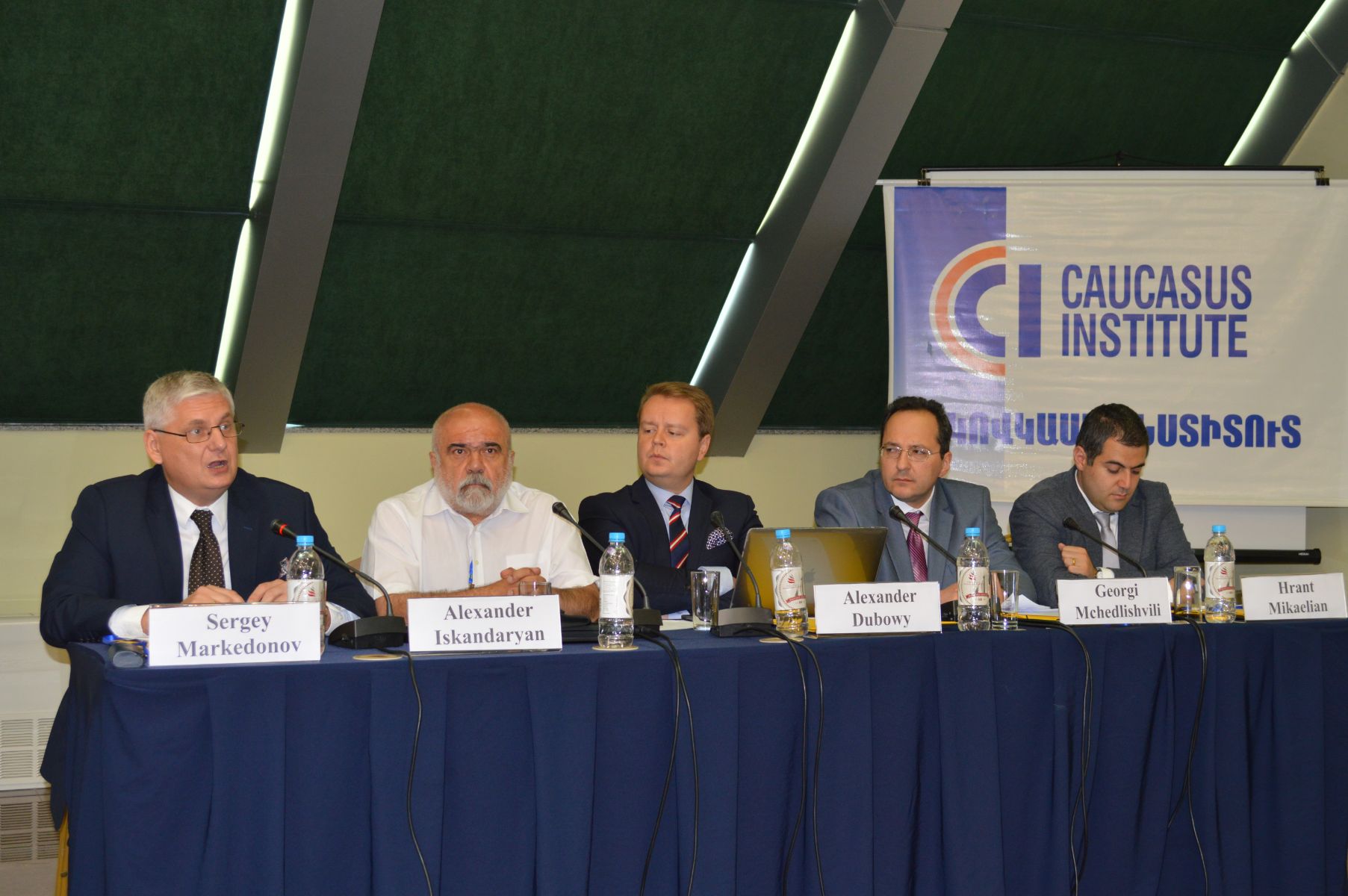 On June 21, 2019, the Caucasus Institute held its annual Caucasus-2018 International Conference at the Elite Plaza Business Centre. The Caucasus Conference is a trademark event that the Caucasus Institute has held in Yerevan, Armenia every spring-summer starting 2003. It brings together experts from the region and abroad to sum up the previous year’s political, societal and economic trends. It is therefore named after the previous year; the conference held on June 21, 2019 was called the Caucasus 2018 International Conference.
On June 21, 2019, the Caucasus Institute held its annual Caucasus-2018 International Conference at the Elite Plaza Business Centre. The Caucasus Conference is a trademark event that the Caucasus Institute has held in Yerevan, Armenia every spring-summer starting 2003. It brings together experts from the region and abroad to sum up the previous year’s political, societal and economic trends. It is therefore named after the previous year; the conference held on June 21, 2019 was called the Caucasus 2018 International Conference.
Each conference begins with a panel analyzing developments in the three internationally recognized countries of the South Caucasus. This year’s presentation on Georgia was made by George Mchedlishvili, Associate Professor of Political Science at the International Black Sea University. For political reasons, it has for several years been impossible to invite an expert from Azerbaijan to present developments in their country; this year, Sergey Markedonov, one of the world’s leading experts on the South Caucasus, analyzed the situation in Azerbaijan. CI director Alexander Iskandaryan made the presentation on Armenia.
The topic of the second panel was the engagement of external players in the Caucasus. Prof. Dr. Mitat Celikpala, Dean of the Graduate School of Social Sciences at the Kadir Has University, Istanbul spoke about Turkey’s regional policies in 2018. Alexander Dubowy, senior researcher at the Austrian National Defence Academy, presented Western policies with regard to the Caucasus in 2018. Pavel Baev, a research professor at the Peace Research Institute (Oslo) spoke about the revolutions on the post-Soviet space.
The third panel of the conference looks at regional security issues, including ethnopolitical conflicts and de-facto states in the South Caucasus, and persistent instability in the Russian Northern Caucasus. In its framework journalist David Petrosyan spoke about the unrecognized republics of Abkhazia, Ossetia and Nagorno-Karabakh. A presentation was made by Russian scholar Akhmet Yarlykapov, a renowned expert on radical Islamism in the Northern Caucasus.
Study Visit
TRANSITION EXPERIENCE EXCHANGE BETWEEN ROMANIA AND ARMENIA PROGRAMME
 A study visit of an Armenian delegation of public officials, journalists, and analysts to Romania took place from May 29 to June 5 within the framework of the program.
A study visit of an Armenian delegation of public officials, journalists, and analysts to Romania took place from May 29 to June 5 within the framework of the program.
The project is a joint initative of the Caucasus Institute (Armenia) and Expert Forum (EFOR, Romania), supported by the Black Sea Trust, a Project of the German Marshall Fund of the United States. The goal of the project was to empower public officials, academics, researchers and journalists to cope with domestic issues that are common in the post-communist states. The project was based on experience exchange through exploration of the Romanian best practices, discourses concerning political transitions in Romania, formats, processes and outcomes of national policies concerning the solutions to the needs, participation and integration of ethnic minority groups in Romania.
The study visit was envisaged as a series of discussions and meetings of the media, political and academic counterparts from Romania and Armenia that will foster the knowledge and practices of national politics. The goal of the project is to broaden the empirical knowledge and develop the political skills in managing democratic processes in the Republic of Armenia.
Roundtable
A YEAR AFTER THE REVOLUTION: EXPECTATIONS AND RESULTS
On May 10, 2019 the Caucasus Institute held a roundtable discussion on the Armenian Velvet Revolution, focusing on the social and economic developments in the past year and how they are portrayed in the media.
The speakers were Hrant Mikaelian, Research Fellow at the Caucasus Institute and Arshaluys Mgdesyan, Editor/Coordinator at the Media Center Project. discussed post-revolutionary expectations, the actual social and economic changes in Armenia, and the interpretation of those changes in the Armenian media discourses.
An open debate followed, moderated by CI research fellow Gor Petrosyan.
Tea party
ELECTIONS IN UKRAINE AND NOT ONLY: WHY DO VOTERS PREFER SHOWMEN?
Zelensky in Ukraine, Donald Trump in the US, Emmanuel Macron in France, the Brexit vote in the UK, the post-revolutionary vote in Armenia, – the phenomenon called protest voting. Tired of traditional politicians, people vote against the establishment and the existing political elite. It is rather post-populism than populism, as it leads to the rupture of the previous populist experience. This were the main points discussed in the first part of the CI Tea Party held on April 30, 2019 and moderated by Alexander Iskandaryan, Director of the Caucasus Institute.
In the second part of the informal discussion the participants proceeded with exchanging ideas on the following issues: can we consider the current developments as the crisis of participatory democracy, why there is so much distrust towards the existing political elites, how will Zelensky’s victory influence Ukrainian-Armenian and Russian-Ukrainian relations, will there be a real breakthrough in the Ukrainian crisis, etc.
Roundtable discussion
NEW ARMENIA: DISCUSSING THE KARABAKH CONFLICT
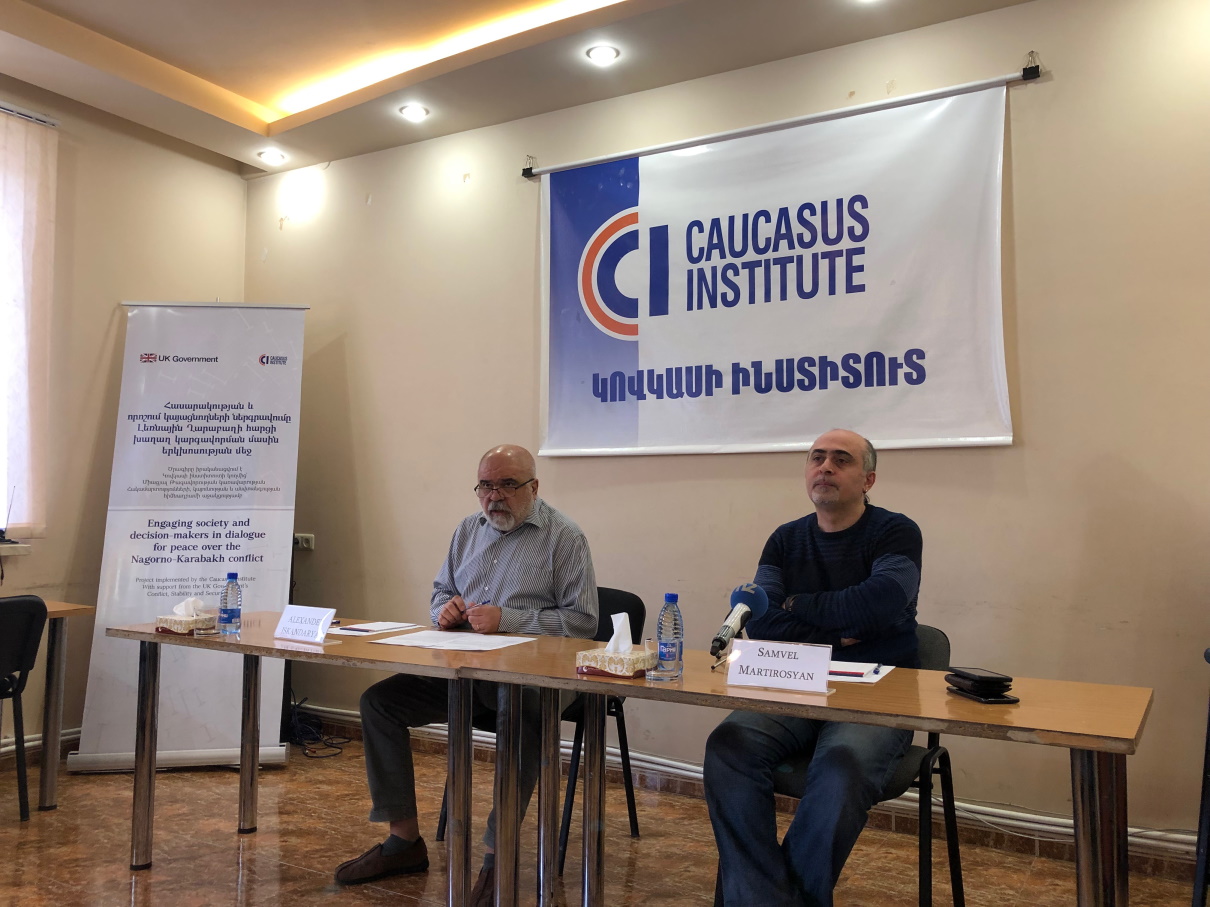 On March 15, 2019 the Caucasus Institute held a roundtable discussion dedicated to the Nagorno-Karabakh conflict and its societal perceptions in view of recent political developments in Armenia. The roundtable was part of a project on Engaging society and decision-makers in dialogue for peace over the Nagorno-Karabakh conflict funded by the UK Government’s Conflict, Stability and Security Fund. The opinions and statements that will be made and discussed during the event may not coincide with the official position of the UK Government.
On March 15, 2019 the Caucasus Institute held a roundtable discussion dedicated to the Nagorno-Karabakh conflict and its societal perceptions in view of recent political developments in Armenia. The roundtable was part of a project on Engaging society and decision-makers in dialogue for peace over the Nagorno-Karabakh conflict funded by the UK Government’s Conflict, Stability and Security Fund. The opinions and statements that will be made and discussed during the event may not coincide with the official position of the UK Government.
The guest speaker of the roundtable was Samvel Martirosyan, social media and information security analyst, media expert. Drawing on the analysis of social media and news media content, Mr. Martirosyan examined the ways in which discourses in Armenia about the Karabakh conflict have been changing in the post-revolutionary period. An open debate followed, moderated by CI Director Alexander Iskandaryan.
Tea Party
NAGORNO-KARABAKH: WHAT NEXT?
On February 19, 2019, the Caucasus Institute organized a tea party with young scholars and students in the framework of a series of informal discussions. The CI Director Alexander Iskandaryan started the discussion introducing the importance of the Nagorno-Karabakh conflict to both Armenia and Azerbaijan through some historical references. He explained that the conflict is at the base of Armenia’s political identity, while in Azerbaijan it is an important tool of consolidation. According to the speaker, currently, the conflict is in a state of frozen activity, which is supported by sociological polls conducted among the Armenian society.
Mr. Iskandaryan also emphasized the importance of the social factor, as the social perceptions need to change with the generations for the two nations to be able to co-exist in the same region. He drew parallels between the post-imperial, disintegrating 18th century Europe and the 21st century South Caucasus, where each nation-state tries to form its separate identity. He, thus, summarized that history has proved that despite the existing deadlock and deepening contradictions conflicts are better resolved when the sides keep negotiating.
Following Mr. Iskandaryan’s speech, the participants of the event engaged in an active Q&A session and a debate-discussion. The main topics of discussions were the influence of democratization on conflict resolution, Armenia’s vision of conflict resolution, whether and how it has changed with each change in government, Pashinyan’s personal factor and the changes that he might introduce into the negotiations process, importance of Iran’s neutrality to the balance of powers in the region, interrelation between high legitimacy of leader and successful foreign policy, prospects for united South Caucasus, etc.
The discussions are held in the framework of a project on Engaging society and decision-makers in dialogue for peace over the Nagorno-Karabakh conflict implemented by the Caucasus Institute with support from the UK Government’s Conflict, Stability and Security Fund. The opinions and statements that will be made and discussed during the event may not coincide with the official position of the UK Government.
Simulation game
MOCK PARLIAMENT
On January 31- February 3, 2019, the Mock Parliament was held in Jermuk, Armenia, an interactive simulation game organized by the Caucasus Institute in cooperation with the U.S. Embassy in Armenia.
The participants were students, scholars, civil society representatives, civil servants and politicians aged 21-35, with interest in decision- and policy- making, rule of law, legislative processes.
The main goal of the project was to promote understanding of Parliamentary form of government among the young civil servants, parliamentary and non-parliamentary political parties, media, students and the public at large and to make the participants feel what it is like to be a decision-maker
